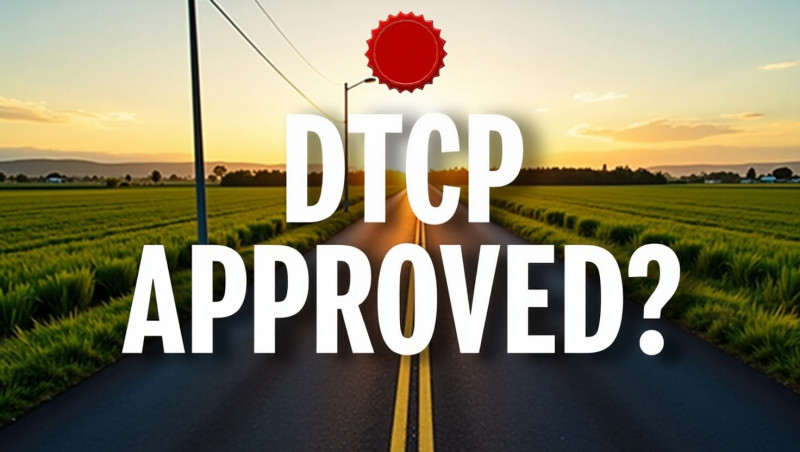- May 06, 2025
-
Selling Your Land? Understanding DTCP Approval in Tamil Nadu
Selling land might seem simple—find a buyer, agree on a price, and sign the papers. But in Tamil Nadu, there’s a legal twist you can’t afford to ignore: DTCP (Directorate of Town and Country Planning) approval. If your plot isn’t DTCP-approved, you could be staring at rejection from buyers—or worse, legal trouble.
So, what’s the deal with DTCP? And how can you get your layout or plot approved, especially if it wasn’t planned in the first place? Here's your complete, plain-English guide.
✅ What is DTCP Approval?
DTCP approval ensures that a land layout—especially those outside the Chennai Metropolitan Area (CMDA)—is developed in line with Tamil Nadu’s infrastructure and zoning regulations.
DTCP looks at:
- Proper road layout
- Drainage and sewage provisions
- Open space reservation
- Zoning compliance (residential, commercial, etc.)
📌 Without DTCP approval, your plot may be considered unapproved, making it harder (or illegal) to sell, build on, or even get utilities.
Quick Look at 2016 & 2017 Regularization Acts
If your land was developed without prior DTCP approval, the Tamil Nadu Government offered a lifeline through two landmark regularisation acts.
🔹 2016 Regularization Act:
Allowed layout owners to apply for approval for plots developed before October 20, 2016. It aimed to bring lakhs of unapproved layouts under legal compliance.
🔹 2017 Regularization Scheme:
Focused on individual plot owners whose lands were part of unapproved layouts. The goal? Boost transparency, encourage development, and regulate land resale.
Both schemes used the portal tnlayoutreg.in for application processing.
🧠 Missed these schemes? Stay alert for new announcements—another regularization window could open.
Key Documents Required for DTCP Approval
If you’re applying for DTCP approval—either for regularization or fresh approval—you’ll need the following documents:
- Application Form – Download from http://www.tnlayoutreg.in
- or fill via the Single Window Portal.
- Affidavit on Stamp Paper – Legal declaration of land details, signed by the owner.
- Patta Copy – Proof that the land is in your name.
- FMB Sketch/Survey Map – Shows land boundaries and government records.
- Chitta/Adangal – Confirms classification and land use.
- Sale Deed – Title ownership and legal history.
- Receipt of Payment – ₹500 application fee (subject to change per new rules).
- NOC or Clearance (if required) – From local authorities, especially in restricted or environmentally sensitive areas.
Where & How to Apply?
You have two options:
🏢 Offline:
Visit the nearest DTCP Office or respective Regional Planning Authority (RPA) office. Staff will guide you through document submission, site inspection, and approval process.
💻 Online:
Use the DTCP Single Window Portal to:
- Register your property
- Upload documents
- Track application status
- Make payments
After verification, a layout approval number will be issued if all is in order.
🛑 Approval isn’t automatic—it requires vetting, field inspection, and document scrutiny.
Why DTCP Approval is Crucial Before Selling
So why should you care about this approval? Here’s what’s at stake:
✅ Legal Compliance
Without approval, your land may be flagged as “illegal layout,” making future transactions risky.
✅ Market Value Boost
DTCP-approved plots attract higher prices and faster sales due to buyer confidence.
✅ Ease of Construction
Buyers need DTCP-approved land for:
- Building permits
- Bank loans
- Electricity and water connections
✅ Avoid Penalties
Selling unapproved plots could result in:
- Legal action
- Fines
- Plot regularization delays
What if Your Land is Unapproved?
If your land doesn’t currently have DTCP approval, here’s what you can do:
- Check Eligibility: Was the layout developed before October 2016? You may qualify under the old regularization acts.
- Visit Your Local DTCP Office: They’ll let you know the latest status of your plot and whether new approval schemes are open.
- Apply Under Layout Regularization Scheme: If applicable, submit all necessary documents and pay the fees.
- Get Legal Help: A local land consultant or real estate lawyer can help simplify the process.
DTCP Approval Checklist for Land Sellers
FAQs
Q1: Can I sell land in Tamil Nadu without DTCP approval?
Technically yes, but it’s risky and often illegal depending on local laws. Buyers may refuse, and authorities can penalize both parties.
Q2: What’s the difference between CMDA and DTCP?
CMDA regulates Chennai and nearby areas, while DTCP handles planning and approvals outside Chennai limits.
Q3: Is DTCP approval required for agricultural land?
Only if it’s converted to residential or commercial use. Otherwise, you’ll need other agricultural permits, not DTCP approval.
Q4: How long does DTCP approval take?
Typically 1–3 months, depending on document completeness and local authority processing times.
Final Thoughts: Make Your Land Sellable—Legally
Selling land in Tamil Nadu? Don’t overlook DTCP approval. It’s the stamp of trust, legality, and market readiness that today’s buyers demand. Whether you're regularizing an old layout or applying fresh, getting DTCP approval is worth the effort.
If your land isn’t approved yet, get started today. It could be the one step that turns a slow listing into a hot property.


Comments :
Currently, there are no comments in this post. Be the first person to comment on this post.